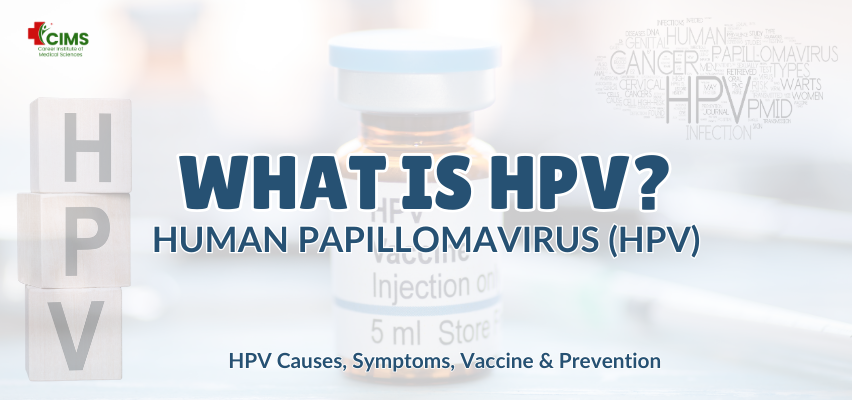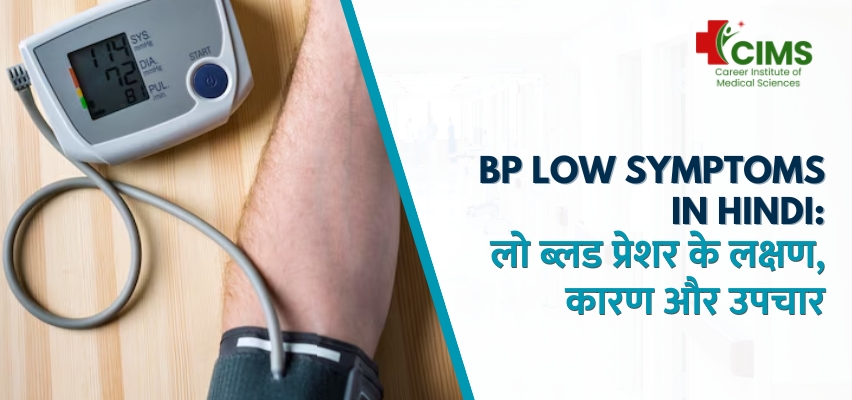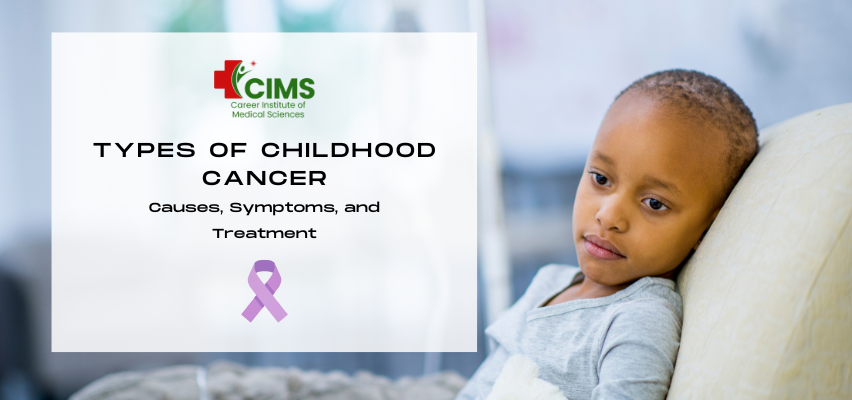Table of Contents
ToggleWhat Is HPV? Human Papillomavirus (HPV)
Human Papillomavirus (HPV), commonly known as HPV, is one of the most common viral infections globally, affecting both men and women. Medical experts believe that almost every sexually active individual will encounter HPV at some point in their lives. In most cases, the body’s immune system clears the virus naturally within a couple of years.
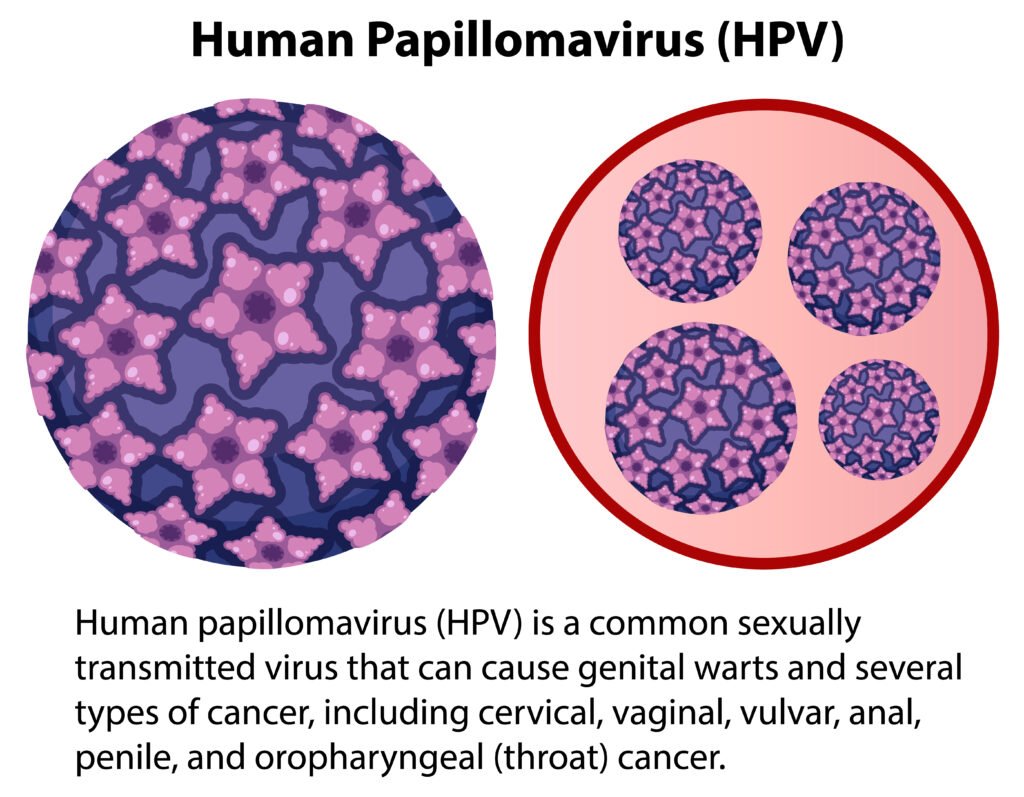
However, certain high-risk strains of HPV can persist and cause serious health problems such as genital warts and even life-threatening cancers, including cervical, anal, penile, and throat cancers. In this blog, CIMS Cancer Hospital, Bhopal, will provide you with essential information, highlighting the Human Papillomavirus (HPV) – its Causes, Symptoms, Vaccine & Prevention.
Types of Human Papillomavirus (HPV)
HPV is not a single virus but a group of more than 200 related viruses. Out of these, at least 40 types can infect the genital areas, mouth, and throat of both men and women.
- Some HPV types are low-risk, causing only warts (skin or genital), but do not progress to cancer.
- Others are High-risk HPV strains, leading to cervical, anal, penile, throat, and vaginal cancers.
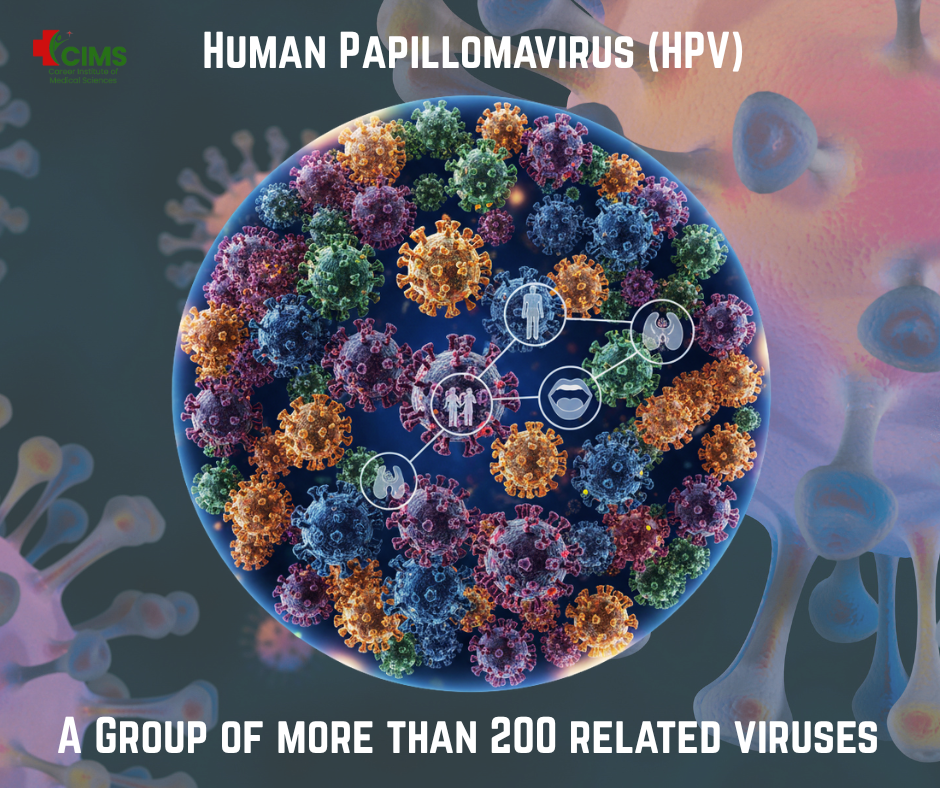
HPV can affect people of all ages, genders, and lifestyles, which makes vaccination and routine screening essential steps in prevention.
HPV types are classified as either low-risk or high-risk.
Type | Examples | Health Impact |
Low-Risk HPV | Types 6 and 11 | Causes genital warts, common skin warts, and respiratory papillomatosis |
High-Risk HPV | Types 16, 18, 31, 33, 45, others | Causes cervical cancer, anal cancer, penile cancer, and throat cancer |
Notably, HPV 16 and 18 alone are responsible for nearly 70% of cervical cancers worldwide, making them the primary target of vaccination programs.
Research Data on Human Papillomavirus (HPV)
According to the World Health Organisation (WHO), cervical cancer—primarily caused by HPV—is the fourth most common cancer in women worldwide.
- In India, around 1.23 lakh women are diagnosed annually with cervical cancer, with over 95% of cases linked to HPV infections.
- Men are not immune, as HPV can lead to penile, anal, and throat cancers.
This data highlights the urgent need for awareness, vaccination programs, and regular screenings, especially in developing countries where access to preventive healthcare is limited.
Human Papillomavirus (HPV) Causes
HPV spreads primarily through skin-to-skin contact during intimate activities. Common modes of transmission include:
- Vaginal, anal, or oral sex with an infected partner.
- Intimate genital contact without intercourse.
- Transmission from an infected mother to her baby during childbirth.
- Rarely, through shared personal items such as razors or towels.
Since HPV can be transmitted without visible symptoms, anyone who is sexually active is at risk, regardless of age, gender, or sexual orientation.
Human Papillomavirus (HPV) Symptoms
Most HPV infections show no symptoms and go away on their own within 1–2 years. However, some infections persist and lead to complications.
- Genital warts: Small, flesh-coloured growths in the genital or anal region.
- Skin warts: Rough, raised growths on hands, feet, or elbows.
- Flat warts: Slightly raised, smooth lesions commonly seen in children.
- Respiratory papillomatosis: Warts in the throat that cause hoarseness or breathing difficulties.
In Women: Symptoms may include irregular bleeding, abnormal vaginal discharge, or pelvic pain, often linked to cervical changes or cervical cancer.
In Men: Warts may appear on the penis or scrotum, and oral HPV can cause throat discomfort or a persistent sore throat.
Human Papillomavirus (HPV) Vaccine
The HPV vaccine is one of the most effective tools for preventing HPV-related diseases and cancers. It works best when administered before exposure to the virus, which is why it is recommended for young adolescents.
- Ideal Age for Vaccination: 9–14 years (boys and girls).
- Catch-up Vaccination: Up to age 26 for those who missed earlier.
- 27–45 years: Adults may also benefit after medical consultation.
HPV Vaccine in India
India has developed its own affordable vaccine called Cervavac, making protection against HPV more accessible. At CIMS Hospital, Bhopal, we provide vaccination for children, teenagers, and adults to ensure maximum community protection.
Screening for Human Papillomavirus (HPV): How Often?
Regular screening is essential for detecting HPV-related abnormalities at an early, treatable stage.
Age Group | Recommended Screening |
21–29 years | Pap smear every 3 years |
30–65 years | Pap smear every 3 years, OR HPV DNA test every 5 years, OR Co-testing every 5 years |
Above 65 years | Screening may stop if past results are consistently normal |
Currently, there is no standard HPV screening test for men, but men showing symptoms should consult a doctor for evaluation.
Human Papillomavirus (HPV) Prevention
You can reduce the risk of HPV infection by:
- Vaccination at the recommended age.
- Using condoms during sexual activity (though they reduce, not eliminate, risk).
- Limiting the number of sexual partners.
- Avoiding smoking and alcohol, which increase cancer risk.
- Regular gynaecological check-ups for women to detect cervical changes early.
Human Papillomavirus (HPV) Treatments
Although the virus itself cannot be cured, its effects and complications can be effectively managed:
- Warts: Treated with topical creams, freezing (cryotherapy), or minor surgery.
- Precancerous lesions: Managed with surgical removal, laser therapy, or ablation techniques.
- HPV-related cancers: Require advanced treatments like surgery, chemotherapy, radiation, or targeted therapies.
At CIMS Hospital, Bhopal, patients receive comprehensive HPV care, including vaccination, early detection, and world-class cancer treatment options.
Human Papillomavirus (HPV) Tests
- Pap Smear Test (Women): Detects abnormal cervical cell changes.
- HPV DNA Test (Women): Identifies high-risk HPV strains.
- Biopsy (Both genders): For suspected lesions or cancers.
Note: Men currently don’t have a standard HPV test, but doctors may check suspicious growths visually.
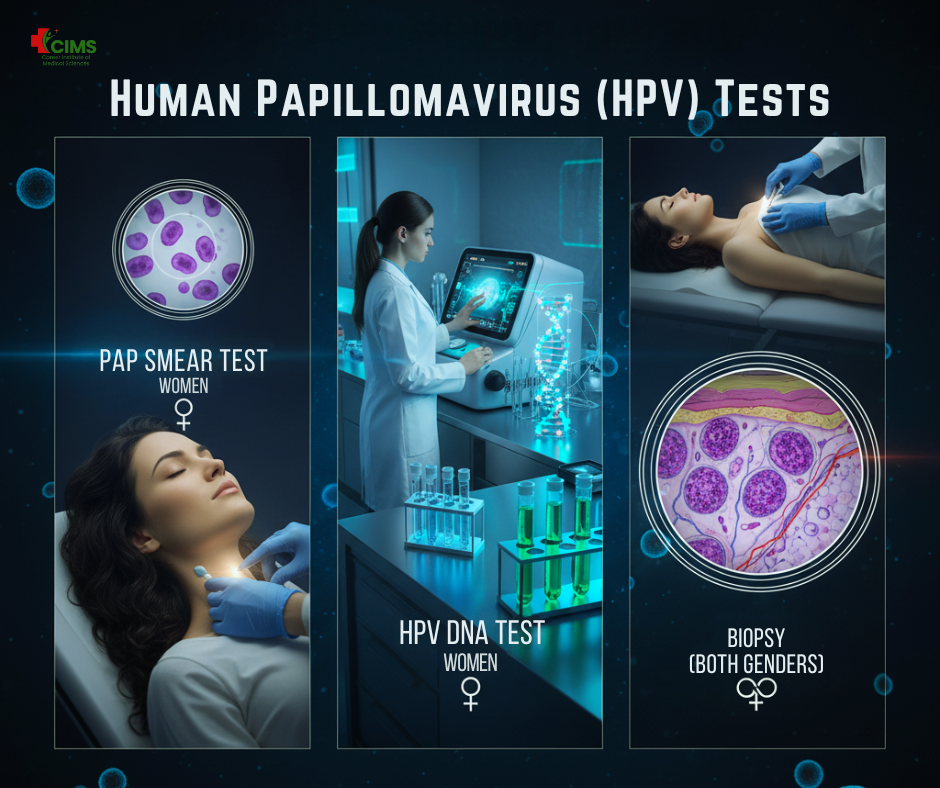
Quick Reference Table
Aspect | Details |
What is HPV? | A group of 200+ viruses affecting men, women, boys, and girls |
Transmission | Sexual contact, skin-to-skin, childbirth |
Symptoms | Warts, abnormal bleeding, pelvic pain, throat issues |
HPV Vaccine | Prevents cancer-causing HPV; ideal at 9–14 years |
Screening | Women: Pap smear/HPV DNA test; Men: Symptom-based check |
Treatment | Warts removal, surgery, chemotherapy, radiation |
Prevention | Vaccination, safe sex, and regular screening |
Final Thoughts: Human Papillomavirus (HPV)
It has become evident that awareness, prevention, and early action are crucial for Human Papillomavirus (HPV). HPV does not discriminate—it can affect men, women, boys, and girls—making it a global public health challenge. The good news is that with the availability of vaccines, regular screenings, and effective treatments, individuals can protect themselves and their families.
At CIMS Cancer Hospital, Bhopal, we are dedicated to promoting HPV awareness, vaccination, early testing, and advanced treatment. With our expert team and modern healthcare facilities, we ensure the highest level of care for all patients.
Visit CIMS Hospital, Bhopal, for HPV vaccination and screening today.
Contact Us
For more information or to schedule a consultation.
Call us at 9522982211.
Author: Rishabh Pandey

